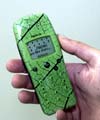| Told or asked? | ||
 |
||||||
|
Somanath from India writes: Which
of the following is correct usage: |
| |
||
| Roger Woodham replies: | ||
| Tell
or ask?
In your example, Somanath, there is very little difference in usage and both are, of course, correct. You might argue that ask is more polite as asking for something is the same as requesting it, whereas telling someone to do something is the same as instructing or ordering them, but in this example either is appropriate. In the following example too, you can use either tell or ask:
But sometimes we need to use tell when the meaning is more explicitly instruct and ask when the meaning is more explicitly request. Compare the following:
|
|||||||||||||
|
Verb + object + to + infinitive In English, there are a wide variety of verbs that have to do with requests, advice and instructions that follow the verb + object + to + infinitive pattern:
Note the difference in meaning in these examples of use:
|
| tell
+ object + that-clause
Note that we also use tell with a that-clause as well as with the to-infinitive pattern. Note the difference usage in this example.
|
||||
| ask
+ if-clause / wh-clause
Note that we also use ask with an if- or a wh-clause when we are reporting yes/no-questions and wh-questions:
|
||||
|
If you would like more practice more please visit our in the You, Me and Us part of our website. |
||||
| |
||